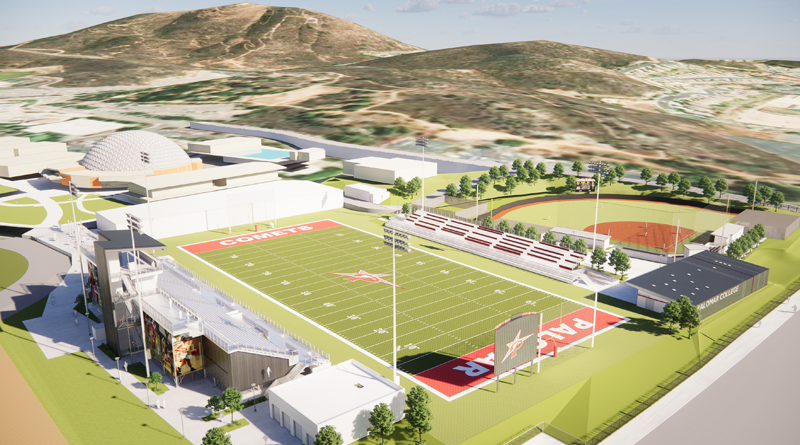Palomar College in SoCal Moves Ahead on First Football Stadium
By Eric Althoff
ESCONDIDO, Calif.—General contractor Erickson-Hall has broken ground on a new athletics facility at this Southern California college. Construction personnel as well as staff from the college gathered in December for a groundbreaking ceremony for the $22.8 million football stadium and softball fields at the school’s San Marcos campus. Palomar College, which was founded in 1946, has never had a football stadium to call its own, and has continually had to play its games at nearby high schools.
The softball stadium will be able to seat 207 people, and will feature batting cages, dugouts, press box, field house and bullpens. Palomar’s softball team is rather respected in the area considering it has taken home eight consecutive championships in the Pacific Coast Athletic Conference.
Meanwhile, the football stadium, which will feature a synthetic turf field and three-story press box, will be able to house nearly 4,000 fans. The stadium will host the first football games to be played at Palomar in over 75 years. Additionally, it will also serve as host to other large events such as graduations.
“The anticipation from the community and student body for Palomar College’s new athletic facilities makes it such a rewarding project,” Mat Gates, Erickson-Hall’s president, said in a recent statement. “We can’t wait to celebrate with Palomar College when they can finally host their first home football game, and see their stellar softball team thrive in their new home!”
HMC Architects designed both of the athletic facilities at the San Marcos campus. In a phone conversation with School Construction News, HMC partner Brad Glassick said that one of the main challenges of constructing new athletic grounds was running into “undocumented utilities” below ground.
“It’s crucial to bring creativity to [solving] a problem you discover in the field,” Glassick said. “That’s proven true here at Palomar.”
Glassick said that one of the ways the project was able to achieve its timeline was working on the bleachers early, which shaved several months off of the project’s lead time.
“We are actually already into the deferred approval process rather than trying to get the bleacher shop drawings done, so that was one way we tried to short-circuit any schedule impacts,” he said.
His firm must also contend with supply chain issues related to electrical switch gear, requiring the architect to potentially make use of others options.
“We’ve looked at a couple different alternative pieces of equipment, so we still have to determine if they meet our project needs,” he said.
Construction on Palomar’s new softball and football stadium is ongoing, with a potential finish date projected for this coming October.
Of the architect’s collaboration with Erickson-Hall, Glassick praised the work HMC has undertaken thus far with the general contractor.
“We don’t have silos, we don’t have our corners to retreat to,” he said. “We all just want to be getting our work done for Palomar College, because we all know the faster we get the work done, the better we are as businesses and [being] successful on the project.”

